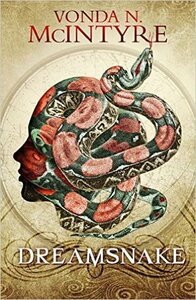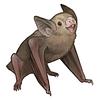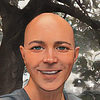Take a photo of a barcode or cover
adventurous
hopeful
inspiring
mysterious
reflective
tense
fast-paced
Plot or Character Driven:
Character
Strong character development:
Yes
Loveable characters:
Yes
Diverse cast of characters:
Yes
Flaws of characters a main focus:
No
„Dreamsnake“ was first published in 1978 and won the Nebula and the Hugo in its time. It was praised for its fresh feminist approach to the dystopian genre. In many ways it reads like a feminist version of „A boy and his dog“. (Harlan Ellison, 1969).
Though Vonda N. McIntyre is the less experienced writer, her story of ‚Snake‘ and her snakes is less aged and more optimistic. McIntyre conducts interesting experiments in „Dreamsnake“. For example there’s one character whose gender is not revealed, because ‚it‘ is described without using gender pronouns at all.
‚Snake‘, the main protagonist, is a strong, self-sufficient woman, who knows about her flaws and is not intimated by the obstacles McIntyre throws at her. The classical love story is reversed, as Snake’s lover, Arevin, has to follow her and clearly is more dependent on her affection than vice versa. But: Though ‚love‘ is described as something that’s not worth depending on, it kinda wins at the end.
„Dreamsnake“ is worth a read, only 230 pages, but its storytelling and its rhythm may make it difficult for modern readers sometimes. „Snake“ is one of the new female heroines that appeared in the late 70ies – Sigorney Weaver (‚Alien‘, 1979) would be a good cast. Without books like „Dreamsnake“ the modern wave of feminism would not have taken place.
Why does Snake not inject the genetically modified venom directly? Why has a real f**king snake to bite you? Apart from this, the showdown at the end of the story came out of nothing for me. The great conflict – how can Snake confront her teachers – is not a topic at the end. Instead we find a UFO-ex-machina which solves the problem after Snake and Melissa get tortured enough to earn their reward. That and the sudden end of the book disturbed me.
Though Vonda N. McIntyre is the less experienced writer, her story of ‚Snake‘ and her snakes is less aged and more optimistic. McIntyre conducts interesting experiments in „Dreamsnake“. For example there’s one character whose gender is not revealed, because ‚it‘ is described without using gender pronouns at all.
‚Snake‘, the main protagonist, is a strong, self-sufficient woman, who knows about her flaws and is not intimated by the obstacles McIntyre throws at her. The classical love story is reversed, as Snake’s lover, Arevin, has to follow her and clearly is more dependent on her affection than vice versa. But: Though ‚love‘ is described as something that’s not worth depending on, it kinda wins at the end.
„Dreamsnake“ is worth a read, only 230 pages, but its storytelling and its rhythm may make it difficult for modern readers sometimes. „Snake“ is one of the new female heroines that appeared in the late 70ies – Sigorney Weaver (‚Alien‘, 1979) would be a good cast. Without books like „Dreamsnake“ the modern wave of feminism would not have taken place.
adventurous
dark
emotional
hopeful
inspiring
mysterious
fast-paced
Plot or Character Driven:
Plot
Strong character development:
Yes
Loveable characters:
Yes
Diverse cast of characters:
Yes
Flaws of characters a main focus:
Yes
Great book! I loved a main character as a healer and even snakes getting being the focus of the magic system (not exactly a magic system given the scifi dystopian setting). Would recommend for anyone who wants a good female lead or likes stories/games with healing characters.
adventurous
challenging
inspiring
mysterious
medium-paced
Plot or Character Driven:
Character
Strong character development:
Yes
Loveable characters:
Yes
Diverse cast of characters:
Yes
Flaws of characters a main focus:
Yes
One of my favorite reads this year, Dreamsnake is both captivating and meaningful. This post-apocalyptic scifi novel is interesting in that the setting, while important to the story, is not a main focus. There is no explanation as to what happened to cause nuclear destruction or the discovery of alien life, rather, the McIntyre mentions they exist and let's the reader fill in the blanks in whichever way they desire. It's so refreshing to read post-apocalyptic literature that isn't entirely focused on the events leading up to the destruction or the violence that's everywhere as a result.
I also enjoyed the character-driven story line. Snake, right from the begining, is extremely likeable while still bring flawed. Her struggle with her identity as a healer is relatable to practically any reader. Her strong morals and persistence to accomplish her goals despite all the shortcomings she faces is admirable and instills in the reader a sense of hope and determination. Snake is, simply put, inspiring.
I would also like to add that another thing I enjoyed about Dreamsnake was the diversity of the characters. Sci-fi has been a male-dominated genre (both in terms of authorship and literary content) since it's founding. Its increddibly refreshing any time I pick up a good sci-fi novel with strong female characters.
I also enjoyed the character-driven story line. Snake, right from the begining, is extremely likeable while still bring flawed. Her struggle with her identity as a healer is relatable to practically any reader. Her strong morals and persistence to accomplish her goals despite all the shortcomings she faces is admirable and instills in the reader a sense of hope and determination. Snake is, simply put, inspiring.
I would also like to add that another thing I enjoyed about Dreamsnake was the diversity of the characters. Sci-fi has been a male-dominated genre (both in terms of authorship and literary content) since it's founding. Its increddibly refreshing any time I pick up a good sci-fi novel with strong female characters.
Minor: Child abuse
adventurous
emotional
hopeful
inspiring
mysterious
tense
fast-paced
Plot or Character Driven:
A mix
Strong character development:
Yes
Loveable characters:
Yes
Diverse cast of characters:
Yes
Flaws of characters a main focus:
Yes
Dreamsnake is one of those reading experiences wherein I so thoroughly enjoy the author's worldview that it's hard to separate that enjoyment from my feelings of the book on more objective measures. Simply put, Dreamsnake is one of those novels that drives the Sad and Rapid Puppies crazy. It's a deeply progressive, feminist, and humanistic novel that is far more concerned with the development of the characters and their ideals than with sleek technology action-heavy escapism. It brings to mind the early Hainish novels of Ursula K. Le Guin, particularly [b:Rocannon's World|92610|Rocannon's World|Ursula K. Le Guin|https://images.gr-assets.com/books/1300039756s/92610.jpg|1357368] and [b:City of Illusions|201889|City of Illusions|Ursula K. Le Guin|https://images.gr-assets.com/books/1382955526s/201889.jpg|89334]. The science fiction elements provide the scantest backdrop (although the elements that are present are well thought out and intriguing) against which McIntyre plays out a heroic journey that subverts many of my least favorite tropes of both classic science fiction and fantasy.
I don't want to go too deeply into the plot for fear of spoiling the experience, but I did want to share some things that I particularly loved about the book.
1. I love the way sex and sexuality is handled in the novel. Rarely have I read fiction wherein the characters so openly and thoughtfully discuss things like consent and birth control. Moreover, it brings to light the problems that cultural shame, ignorance, and inaccurate information can have on both the sex lives of individuals and the healthy functioning of a society. Add to that the fact that book doesn't erase the existence of various and fluid sexual identification.
2. It doesn't conflate action and suspense with mindless physical violence and exploitation. Sometimes I just get exhausted by the sheer amount of violence (physical, emotional, sexual) that takes place in genre fiction. It was refreshing to see that McIntyre was able to make a thoroughly exciting book that didn't devolve into endless laser battles or sword fights.
3. The hero wasn't a superhero with an endless array of powers. Snake is smart and resourceful, without a doubt, and her training ups some of her abilities related to healing and endurance, but for the most part she is a normal person. She isn't stronger than ten people and trained in hand-to-hand combat. She doesn't have a jetpack, blaster pistol, and utility belt full of goodies. She's not even a princess or the daughter of some galactic emperor. Even her power with snakes isn't some magical, mystical endeavor. Rather it's about what you would expect given a solid upbringing and training within a certain tradition. This not only forces her to use many different practical considerations to solve her problems, but it makes her much more relatable of a character.
4. The world doesn't fall into the trap of an unredeemable dystopia or an impossibly perfect utopia. As a related point, the "good" characters have believable faults and blind spots and the "bad" characters have complex motivations behind their actions. The world, though largely pre-industrial, is markedly more liberal on a number of measures, particularly involving sexuality. However, McIntyre shows that, despite this, inequality, greed, abuse, and many other societal ills have not fallen by the wayside.
Dreamsnake is one of the relatively few novels to have one both the Hugo and Nebula award for best novel, and McIntyre was only the second woman to accomplish this feat (after Le Guin). Though it was first published in 1978, it is just as resonant and relevant to today's world (one of the true markers of a great book, in my opinion.) Highly recommended!
I don't want to go too deeply into the plot for fear of spoiling the experience, but I did want to share some things that I particularly loved about the book.
1. I love the way sex and sexuality is handled in the novel. Rarely have I read fiction wherein the characters so openly and thoughtfully discuss things like consent and birth control. Moreover, it brings to light the problems that cultural shame, ignorance, and inaccurate information can have on both the sex lives of individuals and the healthy functioning of a society. Add to that the fact that book doesn't erase the existence of various and fluid sexual identification.
2. It doesn't conflate action and suspense with mindless physical violence and exploitation. Sometimes I just get exhausted by the sheer amount of violence (physical, emotional, sexual) that takes place in genre fiction. It was refreshing to see that McIntyre was able to make a thoroughly exciting book that didn't devolve into endless laser battles or sword fights.
3. The hero wasn't a superhero with an endless array of powers. Snake is smart and resourceful, without a doubt, and her training ups some of her abilities related to healing and endurance, but for the most part she is a normal person. She isn't stronger than ten people and trained in hand-to-hand combat. She doesn't have a jetpack, blaster pistol, and utility belt full of goodies. She's not even a princess or the daughter of some galactic emperor. Even her power with snakes isn't some magical, mystical endeavor. Rather it's about what you would expect given a solid upbringing and training within a certain tradition. This not only forces her to use many different practical considerations to solve her problems, but it makes her much more relatable of a character.
4. The world doesn't fall into the trap of an unredeemable dystopia or an impossibly perfect utopia. As a related point, the "good" characters have believable faults and blind spots and the "bad" characters have complex motivations behind their actions. The world, though largely pre-industrial, is markedly more liberal on a number of measures, particularly involving sexuality. However, McIntyre shows that, despite this, inequality, greed, abuse, and many other societal ills have not fallen by the wayside.
Dreamsnake is one of the relatively few novels to have one both the Hugo and Nebula award for best novel, and McIntyre was only the second woman to accomplish this feat (after Le Guin). Though it was first published in 1978, it is just as resonant and relevant to today's world (one of the true markers of a great book, in my opinion.) Highly recommended!
adventurous
dark
hopeful
fast-paced
Plot or Character Driven:
Plot
Strong character development:
No
Loveable characters:
Yes
Flaws of characters a main focus:
No
As dated as the style might be in terms of post-apocalypse sci fi, this novel was a surprisingly thoughtful and well considered view of the far future. In keeping with the Mad Max and Fallout franchises of this world, we are treated to a blasted Earth future in which small enclaves of higher technology and science are either benevolent and kind or selfish and isolationist towards neighbouring human settlements. We follow a healer from one such benevolent enclave, "doing the rounds" of the countryside to help where she can.
As with a lot of female written science fiction I've read recently, this work focuses much more on the characters, their fears and hopes, their struggles rather than the sci-fi world around them. The apocalypse and alien presence is barely hinted at, as it's something that happened long ago and has been accepted as fact without need of explanation. The real story here isn't the surroundings, it's the desperate struggle to survive in a decaying system.
As with a lot of female written science fiction I've read recently, this work focuses much more on the characters, their fears and hopes, their struggles rather than the sci-fi world around them. The apocalypse and alien presence is barely hinted at, as it's something that happened long ago and has been accepted as fact without need of explanation. The real story here isn't the surroundings, it's the desperate struggle to survive in a decaying system.
adventurous
fast-paced
Plot or Character Driven:
Character
Strong character development:
Yes
Loveable characters:
Yes
Diverse cast of characters:
Yes
Flaws of characters a main focus:
Yes
adventurous
emotional
hopeful
inspiring
mysterious
sad
tense
medium-paced
Plot or Character Driven:
Character
Strong character development:
Yes
Loveable characters:
Yes
Diverse cast of characters:
Yes
Flaws of characters a main focus:
Complicated
This seems like the first book of a series moreso than a standalone. Even if you accept the past as a given, a sort of surface-level explanation for the Mad Maxian style setting, you still have the mysteries of the aliens, the Center and the dreamsnakes in the broken dome. The condemnation by Jesse's brothers on the genetic modification that Snake and the Healers do is another interesting and open question, as are the Healers themselves--how they are trained, what it is that they actually do. I don't mean that these are failures of world building or plot holes, but rather clear tee-ups to opportunities to explore deeper concepts and themes that the book moves on from and seems uninterested in. Like the surface-level portrayal of Ras as this total villain, and the very unbelievable turn from the mayor to condemning him once his abuse is revealed, but no further indictment of their society which allowed that abuse to happen and be invisible in the first place.
(It's like a very episodic SFF TV series from the 90s, or Netflix's The Witcher right now ...)
Instead, there is a lot of 'see how this provincial group of folks react to a stranger coming to town who knows better than them about their best interest.' Not to say Snake is some colonizing force (well, I mean, is she a white saviour?), but there are certainly weird politics around the stereotypical archetypes of tribal, desert people and I found it sort of hilarious and convenient that the most beautiful man is a blond-haired blue-eyed dude. That said, the 'love story' is the very least interesting thing in the book.
Also, the snakes (Mist and Sand) are barely in the second half! Needs more snakes!
(It's like a very episodic SFF TV series from the 90s, or Netflix's The Witcher right now ...)
Instead, there is a lot of 'see how this provincial group of folks react to a stranger coming to town who knows better than them about their best interest.' Not to say Snake is some colonizing force (well, I mean, is she a white saviour?), but there are certainly weird politics around the stereotypical archetypes of tribal, desert people and I found it sort of hilarious and convenient that the most beautiful man is a blond-haired blue-eyed dude. That said, the 'love story' is the very least interesting thing in the book.
Also, the snakes (Mist and Sand) are barely in the second half! Needs more snakes!







